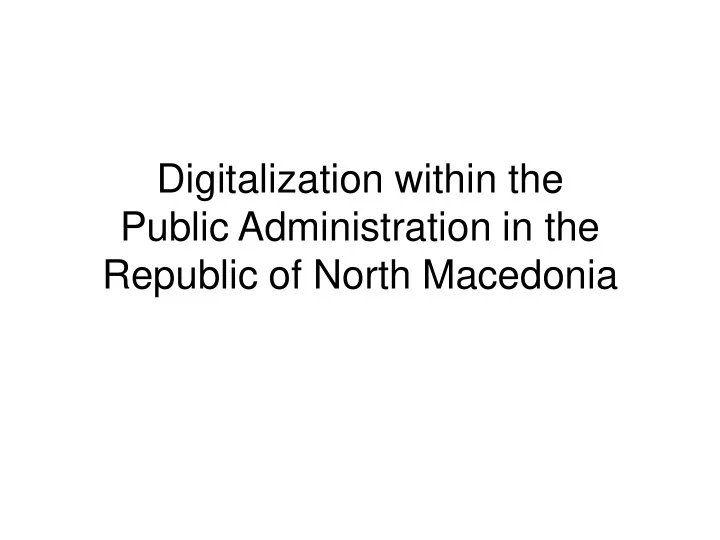

Digitalization within the Public Administration in the Republic of North Macedonia
Content • Promotion of ICT sector in RNM • Centralized management of ICT resources in RNM • Legal framework for digitalization • Digitalization of the public sector • Automation of the administrative procedures • Easier access to the digital world - the Internet anywhere
Promotion of ICT sector in RNM • A Digital Forum has been set up to support the ICT chambers and stimulate the ICT sector, comprised of representatives of ICT chambers, Universities, the Minister of MISA, the President of the National ICT Council, as well as NGOs working in the ICT field. • Subsidizing their technological advancement and equipping. • Tax incentives for export-oriented companies that develops Software solutions and provides an IT services (corporate income tax for ICT development will be reduced to 3%). • Profit tax reduction will be decreased on 5%. • Supporting e-commerce opportunities.
Centralized management of ICT resources in RNM • A Roadmap to ICT Strategy has been prepared. • The preparation of the Long-term National ICT Strategy with Action Plan funded by the EU IPA program has started. • A National ICT Council has been set up, as well as an operational body for expert operational and logistical support to the Council whose primary task is to develop and monitor the implementation of the National ICT Strategy, as well as to monitor and improve the ICT equipment of public sector institutions. • A Digital Agency will be set up to centralize all ICT resources (incl. equipment and ICT staff). It will upgrade and standardize the ICT segment, increase the level of ICT resource utilization and improve ICT services to all government institutions.
Legal framework for digitalization • Law on electronic documents, electronic identification and trust services (harmonized with EU eIDAS regulation) • building trust in the online environment • establishing the legal regime for electronic signatures, electronic seals, electronic time stamps, electronic documents, electronic registered delivery services, website authentication services • creating conditions for the mutual recognition of key enablers across borders and for interoperable e-government services across the European Union • Law on Electronic Management and electronic services • basis of the G2G communication in the country • regulates the exchange of data and documents in electronic format between government institutions • ensures a unified platform for data and document exchange • Law on Central Population Register • establishes the population register using decentralized data model,
Digitalization of the public sector • The basic electronic registers have been established: the central population register and the spatial data register. Further more, the completion of other registries important for the electronic exchange of data between the institutions is ongoing. • The full register of permanent and temporary contracted employees in the public sector has been established (Public Administration Register). • We are working intensively on developing electronic services. • As a country of great cultural and historical wealth, its full digitization is planned.
Automation of the administrative procedures • In order to exchange data between the institutions in real time, an interoperability system has been developed. Through that system, the data of a particular institution is made available to any other institution in need of it, using web services in a secure closed environment. • The first phase of the project "One point of service" (which will later become "Public service centers", as a one point of service in several cities in the country), was started this year, and the citizens can get more than 40 services and information from 10 institutions in one place. • The process that will enable full electronic issue of the 50 most frequently issued certificates or documents, is proceeding well, and we expect that their number will be increased by 10% every six months, through the National e-Services Portal. • We are continuously improving the concept of Open Government, where applying the most modern ICT measures and strategies will improve the transparency of the government institutions.
Easier access to the digital world - the Internet anywhere • Reduce the prices of the mobile operators’ services by “opening the door” for a third mobile operator. • Investing in North Macedonia Mobile Communication Market is in the final phase. • A database of all communications infrastructure built with public funds has been established, for the first time. • The National Operational Broadband Plan is adopted. • A complete mapping of the existing and planned broadband coverage of the entire territory within the country was carried out. • Introducing a Single Sign On solution, ensuring unified access to all state institutions’ systems, be accessible to the citizens and the business community. • An initiative to join the EU's European Interoperability Program has been launched.
Security in the digital world • National Center for Computer Incident Response of the Republic of Macedonia – MKD-CIRT established • National Cyber Security Strategy and Action Plan 2018 – 2022 published • Cyber Resilience • Cyber Capacities and Cyber Security Culture • Combating Cyber Crime • Cyber Defence • Cooperation and Exchange of Information • National Cyber Security Council established, consisting of Minister for Information Society and Administration, Minister for Interior and Minister for Defence
Recommend
More recommend